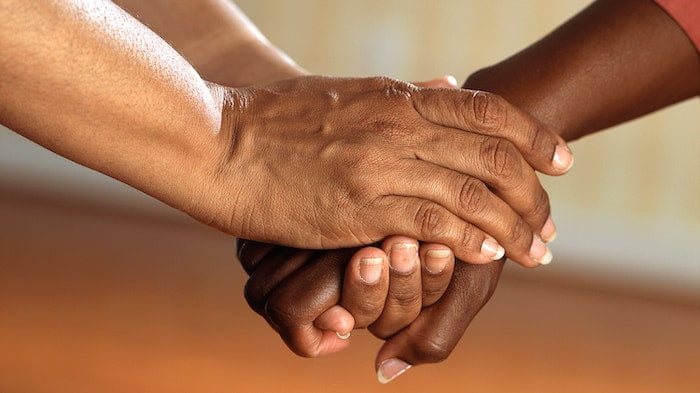How to Deal with Anxiety at Work
Generalised Anxiety Disorder (GAD) is a general feeling of unease and worry, which can range from mild to severe.
GAD is a long-term mental illness concerning a range of events rather than one specific situation or fear.
This form of anxiety takes hold of an individual most days, and individuals cannot usually remember the last time they felt relaxed.
Anxiety disorders have a range of symptoms that are both mental and physical:
- Constant worry
- A feeling of restlessness
- Trouble concentrating
- Heart palpitations
- Chest pains
- Sweating and flushing
- Dizziness
- Stomach aches
- Short tempered or ‘snappy’
Feeling anxious at times is normal and quite healthy, especially in situations such as job interviews, exams, or after a night of too much alcohol.
However, when anxiety takes over your life, such as at work and at home, it might be time to do something about it.

What causes anxiety? The exact mechanics behind mental health are not completely understood, and sometimes it can be totally random. However, studies have found common ground in several factors:
- Genetics inherited from parents
- History of stressful experiences and trauma
- Health conditions
- Drug abuse
- Alcohol abuse
For help understanding anxiety and workplace stress, talk to us today on 0800 088 66 86
Workplace Anxiety

Anxiety at work can involve both anxiety about work and in the workplace.
This anxiety concerns feeling tense and stressed about work, such as workplace performance, colleagues (social phobia), speaking, or delegating tasks.
Workplace anxiety is more common than you may think, as the pressures of modern life can quickly become more than you can cope with.
This can present with both mental and physical symptoms, leaving a negative impact on your career.
Pressure can motivate people to work harder, energising people and making them feel powerful. However, too much pressure will make them burn out, leading to harmful consequences.
Work-related stress and pressure put people at risk of mental health conditions such as depression and anxiety, causing a toxic environment for some workers.
In 2021, research found that around 1 in every 40 workers is heavily affected by work-related anxiety or depression
This has meant that people have taken over 18 million workdays off sick due to ill health.
The common worries of workplace anxiety are:
- The commute to work, such as getting there on time or finding your way
- Financial issues with the salary
- Colleague interaction
- Meeting participation and public speaking
- Performance reviews
- Presentations
- Meeting specific deadlines
- Whether you are in the right career for you
This often leads people to:
- Take too long to do things
- Feel overwhelmed by even the smallest of tasks
- Forget important things
- Be unable to concentrate or focus
- Take sick days
- Lose productivity
- Project anxiety into family or social life
- Suffer from physical issues such as headaches and stomach pains
Workplace anxiety can be random, or it can be caused by job-related reasons such as:
- Conflict with other workers and management
- Feeling out of control with the level of work
- Job security and financial climate
- Unrealistic deadlines
- Unpredictable work or meetings
- Fast-paced environment
- Overly competitive colleagues and workplace
- Difficult daily tasks
This can be exacerbated by an underlying mental health condition. It can also come from other personal issues such as motivation or emotions.
Don’t let anxiety control your life – call us today on 0800 088 66 86
Dealing with Workplace Anxiety

Coping with workplace anxiety is possible and can be managed using specific coping mechanisms that are tailored to your needs.
Speaking Out: Managers and Co-Workers
Speaking to anyone, managers or co-workers, can help to ease anxiety. This may not be easy, but they may be able to offer you help or guidance with your anxiety. You are not the first person to suffer from workplace anxiety, and you won’t be the last.
Many workers do not disclose anxiety to their workforce or hiring managers because they do not want to seem unwilling or weak, and they might be worried about losing out on bigger jobs or promotions.
It is important that you know you cannot legally be discriminated against due to anxiety, as long as you are able to perform specific duties reasonably.
Whilst these fears are common and valid, it is important that you discuss your worries in order to prevent a decline in mental health. If you do not want to speak to your manager or welfare officers, try and speak to a friend or colleague.
Having someone close to you that understands the work demands could lower stress levels, and remind you that you are not on your own.

Learn Your Limits
Knowing your work limits, such as workload, deadlines, and social ability, means that you are more likely to get tasks finished on time and to a decent standard. The following may help you work within your limits:
- Try to focus on one single task at once, organising the rest of your work
- Prioritise your tasks according to importance and deadlines
- Listen to music if you can
- Walk or exercise during before or after work, or during your breaks
- Meditate during the day
- Recharge when you can
Using quick coping mechanisms can quickly aid anxiety if you have a sudden onset. These strategies may be:
- Going outside for fresh air
- Breathing exercises
- Short chat breaks with friends or colleagues
- Visualisation
- Read a book, watch funny videos, and shift your attention
- Grounding exercises
Grounding exercises shift your attention from potentiality to actuality. This means that you are trying to connect all of your senses to your physical surroundings.
The classic grounding techniques involve:
- Acknowledge 5 things you can see
- Acknowledge 4 things you can touch
- Acknowledge 3 things you can hear
- Acknowledge 2 things you can smell
- Acknowledge 1 thing you can taste
If you are in the office, you may have to adjust to your surroundings. For example, try holding a hot or cold beverage, listening to music or calming sounds, smelling some perfume or oils, or tasting something strong like gum or citrus.
Quick coping strategies in times of anxiety can make you feel immediately calmer.

Health and Wellbeing
Anxiety is a natural response to stress, leading to an increased heart rate, panicked breathing, and trouble concentrating. Anxiety presents differently in different people – some may have a panic attack during the commute to work, and others may start sweating during presentations or meetings.
However, this is somewhat controllable by making adjustments to your daily habits and routines.
Exercise, sleep, diet, and mindfulness all have their part to play in how we feel mentally.
Regular exercise and fresh air help us stay physically healthy, but it also helps us stay mentally healthy. Studies have suggested that people who engage in physical activity tend to experience fewer mental health symptoms than those who don’t.
Physically, exercising regularly results in adaptions in the human body. Exercise has been linked to a lower hypothalamic-pituitary-adrenal (HPA) axis and hympathetic nervous system reactivity. The HPA axis plays a vital role in our response to stress.
Psychologically, we tend to misinterpret situations, catastrophising all anxiety-related situations whilst thinking about what might go wrong. A link has been found between exercise and anxiety sensitivity.
One of the relationships between the two suggests that many people with anxiety tend to avoid exercise, as some of the sensations may be interpreted as anxiety or panic, such as a high heart rate.
However, not only does exercise relieve stress and tension, but exposure to anxiety symptoms without anxiety as a cause may increase the tolerance for such symptoms.
This is a form of exposure therapy; individuals may get used to their feared sensations, and despite being uncomfortable, they do not pose a threat.
Repeating this type of exposure will rewire the brain to not expect danger every time the individual experiences a symptom of anxiety.

Exercise also pumps up levels of endorphins, a ‘feel-good’ neurotransmitter acting as a natural pain reliever and mode of positivity.
Exercise releases positive chemicals in the brain such as:
- Serotonin
- Gamma-amniocytic acid (GABA)
- Endocannabinoids
Exercise may also divert attention away from stress and worries, giving you something you can control.
You can also control your alcohol and caffeine intake. Too much of either of these substances have been known to cause anxiety.
If you are sensitive to caffeine and can feel the difference between the number of coffees you have each day, consider cutting down on caffeine.
People also drink alcohol to calm the effects of anxiety, as alcohol tends to have a sedative effect.
However, drinking too much alcohol can make mental health worse in the long run. Individuals may feel the effects of ‘fight or flight’ reaction once the alcohol leaves the body, commonly known as ‘hangxiety’.
This is the vicious cycle of mental health, as symptoms of mental health drive people to self-medicate using alcohol or drugs, which in turn worsens their mental health.

Mindfulness and Sleep
Mindfulness is a state of mind, involving being aware and present in the moment. This type of meditation focuses all attention on the senses and feelings onto the immediate present/
Without intense interpretation or judgement, individuals practice different breathing methods and other practices such as guided imagery to reduce stress and tension.
This is best done in a quiet and comfortable space, but it can be done impromptu in the office if needed. Step out of work for a period of time and expand your awareness. Become aware of your breath and focus on your senses and what you are feeling.
A bad night’s sleep, disturbances, and insomnia are all common symptoms of anxiety. This relationship works both ways – people with anxiety are likely to have trouble sleeping, and a lack of sleep can exacerbate underlying anxiety.
Distress about sleep can make people preoccupied with how much sleep they are getting and how tiredness may affect their work.
This anticipation anxiety can then affect how much you sleep, waking you up regularly in the middle of the night.
Lack of sleep can also affect your mood and how emotional you are, exacerbating mental health issues.
If you struggle to sleep because of anxiety, or a lack of sleep is causing your anxiety, there are natural methods that may help you.
Along with medication and behavioural therapy, try to create a better sleep schedule using healthier habits. For example:
- Fresh sheets and a cooler room
- Exercise in the fresh air during the day, tiring out your body
- Avoid caffeine and alcohol in the afternoon and evening
- Avoid screens and devices at least an hour before bed
- Have a shower or bath to relax before you go to bed
- Try deep breathing when you get into bed (mindfulness)
- Try listening to calming music or podcasts (not intense ones)
- Medication and guided imagery
Find the support you need to overcome workplace anxiety by talking to our expert team on 0800 088 66 86
If You Aren’t Coping

Along with the tips and mechanisms stated above, your anxiety might still be difficult to cope with.
If this is the case, you may require additional help from a mental health professional. This can be done online or in person.
You may be advised to take time off work (Family and Medical Leave Act), or you may be offered outpatient therapy to receive medication and therapy whilst still attending work.
Feeling anxious at work or about work is very common and can appear for a number of reasons. Coping strategies may help reduce this anxiety and seeking help can address underlying causes.
Anxiety can affect both mental and physical health, working its way into all aspects of daily life.
If you are struggling with work-related anxiety, reach out to us today on 0800 088 66 86




